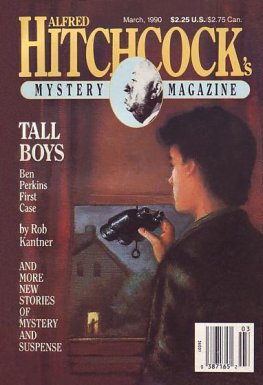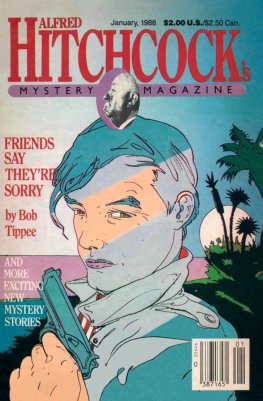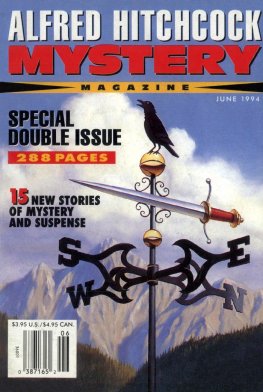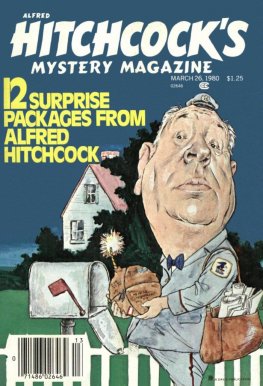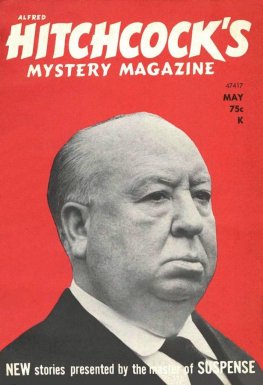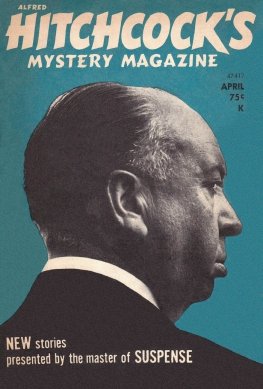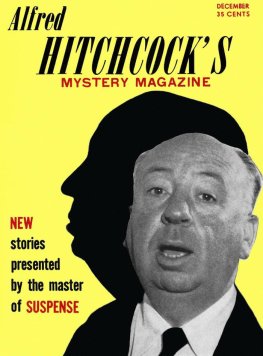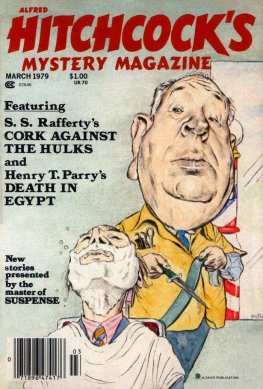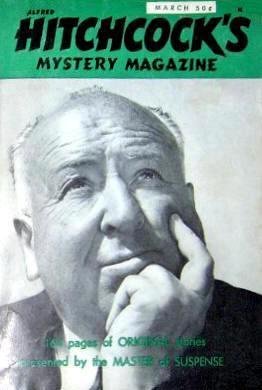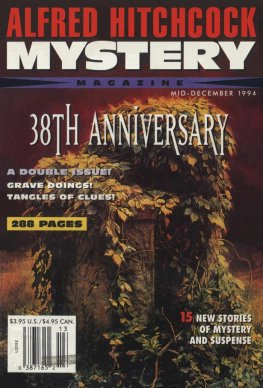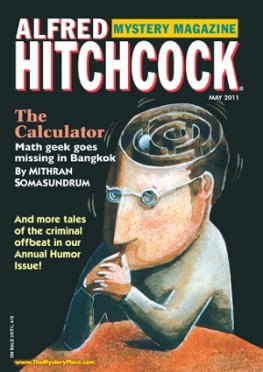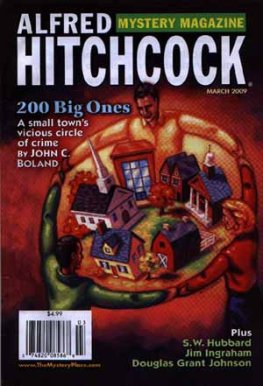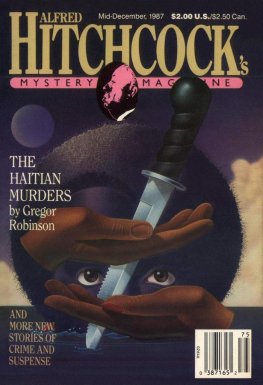Robert Stivenson - Alfred Hitchcock’s Mystery Magazine. Vol. 35, No. 3, March 1990
Here you can read online Robert Stivenson - Alfred Hitchcock’s Mystery Magazine. Vol. 35, No. 3, March 1990 full text of the book (entire story) in english for free. Download pdf and epub, get meaning, cover and reviews about this ebook. City: New York, year: 1990, publisher: Davis Publications, genre: Detective and thriller. Description of the work, (preface) as well as reviews are available. Best literature library LitArk.com created for fans of good reading and offers a wide selection of genres:
Romance novel
Science fiction
Adventure
Detective
Science
History
Home and family
Prose
Art
Politics
Computer
Non-fiction
Religion
Business
Children
Humor
Choose a favorite category and find really read worthwhile books. Enjoy immersion in the world of imagination, feel the emotions of the characters or learn something new for yourself, make an fascinating discovery.
- Book:Alfred Hitchcock’s Mystery Magazine. Vol. 35, No. 3, March 1990
- Author:
- Publisher:Davis Publications
- Genre:
- Year:1990
- City:New York
- ISBN:0002-5224
- Rating:4 / 5
- Favourites:Add to favourites
- Your mark:
- 80
- 1
- 2
- 3
- 4
- 5
Alfred Hitchcock’s Mystery Magazine. Vol. 35, No. 3, March 1990: summary, description and annotation
We offer to read an annotation, description, summary or preface (depends on what the author of the book "Alfred Hitchcock’s Mystery Magazine. Vol. 35, No. 3, March 1990" wrote himself). If you haven't found the necessary information about the book — write in the comments, we will try to find it.
Alfred Hitchcock’s Mystery Magazine. Vol. 35, No. 3, March 1990 — read online for free the complete book (whole text) full work
Below is the text of the book, divided by pages. System saving the place of the last page read, allows you to conveniently read the book "Alfred Hitchcock’s Mystery Magazine. Vol. 35, No. 3, March 1990" online for free, without having to search again every time where you left off. Put a bookmark, and you can go to the page where you finished reading at any time.
Font size:
Interval:
Bookmark:
Alfred Hitchcocks Mystery Magazine. Vol. 35, No. 3, March 1990

My Mother, My Daughter, Me
by Margaret Maron

It isnt just me, is it? Surely other mothers of little girls experience this uncanny sensation when time overlaps and folds back, when they feel theyve lived this incident before in another body or seen it through different eyes?
For instance, when I tell five-year-old Beth, Youre not going out in shorts in the middle of winter! and she glares at me a long level moment before she stalks off to change, then I know I mean I really know exactly what shes feeling. More than that, I am her, whirling away from my mother and biting back the rebellious words that would get me a spanking.
I flounce upstairs and yank open the dresser for those ugly woolen slacks, banging my anger, but not hard enough to bring Mama up with the fly swatter. (And how come that never gets put away for winter?)
With an almost physical jerk, I pull myself back to the present of 1965. Im me again and getting irritable and if Beth slams the drawer just one more time, shes going to get a smack on the bottom.
You see? Its been like this since she was a toddler. My husband doesnt understand; but a girlfriend said recently, I never liked my mother much till my daughter started glaring at me every time I spoke to her. Suddenly I understand. Yes.
And yet, somehow, that isnt exactly it. Not all of it anyhow. Even though Im an adult now, safely married with a successful husband, comfortable house, and daughter of my own, its only the child I once was that I fully understand, not Mama. I was probably no more aggravating than Beth, but these day-to-day flashes of irritation dont make me stop loving Beth. So why did Mama stop loving me?
Perhaps if she hadnt died the year I married Carter, Beths birth could have bridged the unspoken distance between us. Or is the apparent warmth between most mothers and their grownup daughters only a mutual pretense while the politeness between Mama and me is the unavoidable reality?
Must Beth and I come to that?
I was four, almost five, when I learned not to take Mamas love for granted. Her moods were as uncertain as that wartime spring of 1945. There were moments of unquestioned security, but too often I would look up from play and see her watching me from a window, her eyes bleak with foreboding almost as if I were a Nazi hand grenade primed to explode in her face.
Eventually, as the larger world groped its way back to sanity, so did my small one. My father came home from the Merchant Marine to stay, and by the time I was an adolescent, the stiffness between Mama and me was taken for granted. Yet even now, twenty years later, when Beth touches in me a sense of dj vu and I look at myself /Mama through Beths/ my eyes, then I yearn for that barely-remembered closeness and again I wonder...
Today I sit before the mirror in my bedroom, intent on getting my makeup exactly right. Im meeting my husband for dinner and, like most men, Carter feels flattered when he thinks Ive taken special pains just for him. Except for slipping into my new mini-skirted A-line, I can leave as soon as our teenaged neighbor gets home from school to sit with Beth.
Beth sprawls across my bed as she watches me in the mirror and whines halfheartedly about being left behind. She knows I wont relent and that Karen will indulge her most outrageous demands, but she has to keep her hand in. Her restless fingers flip the dial of my clock-radio, and as the serious tones of a newscast fill the room, I lift my hand to keep her from changing it. My favorite cousin is with the Seventh Fleet, but it isnt mentioned; and when I drop my hand, Beth turns to a rock station, muttering, Why do they always have to have wars?
Why? I echo silently. The newest Beatles song floods the room, but Im lost in sudden memories of the staccato war bulletins that used to burst from our old radio and transfix the grownups in alert uneasiness. The words, urgent and tense and half-obscured with static, meant nothing to me; but that sudden adult fear made me afraid, too, without knowing why.
After God bless Mama and Daddy, I was taught to pray, and bring Uncle Paul home safe from the war. But that was as much a part of the ritualistic ending as and-make-me-a-good-girl-amen. Uncle Paul, Mamas younger brother, had been in Europe for three of my four years and I did not remember him. He was killed at Bastogne in December of 1944, although it was March before we knew for sure. When Mama put down the phone, I was appalled. Id never seen her cry, had never realized there were things that could, make an adult cry.
Someone I forget just who put an arm around Mama and shooed me off to the candy store with a handful of pennies. That night Mama interrupted my prayers harshly. Didnt you understand? Uncle Paul is dead! And so I stopped praying for him, even though his deletion left a gap in the singsong formula that bothered me for months.
Eyes finished, I begin on my lips and Beth draws near to watch. She stands on one foot and leans against my bare shoulder, staring at me in the mirror objectively while her lips arc in unconscious imitation. Amused, I recall watching Mama put on her blood-red lipstick; but this is only another of those surface memories that color all our familiar actions when our children watch.
Bored, Beth goes to the window to look for Karen, then returns to play with the dozen or so perfume vials on my dressing table, souvenirs of all the foreign ports my cousins ship has visited.
A schoolbus rumbles to a halt outside and the little glass bottles tinkle as Beth whirls away, dancing across the room to the window.
Karen! Wait! Im coming now! she shrieks, and kisses me hastily. I hear her light footsteps patter on the stairs as I, too, call down to Karen with last-minute instructions.
Beth waves up to me as I stand at the window in my lace-trimmed slip; and although her smile is gay, though she leaves me without another backward look, skipping up to Karen and draping the older girls sweater around her thin shoulders as she follows Karen across our wide lawn, I am suddenly filled with unbearable anguish and something colder.
Guilt?
Guilt at deserting my child?
Ridiculous! Im as good a homemaker as Donna Reed, as devoted a mother as June Cleaver. Surely the few hours Im away each week take nothing from Beth. Her father and I will be home before nine thirty. Carter doesnt like late hours or any music that rocks harder than Pat Boones, and after six years of marriage, we dont exactly linger over candlelit tables.
But the feeling of guilt persists, overshadowed now by a growing sense of desolation so strong that I sit down before the mirror again, perplexed. Absently I straighten the perfume bottles Beth has muddled and see that one has come unstopped. Its a small cube of dark green porcelain, sprigged with minute red roses, and its heavy fragrance permeates down through layer after layer of suppressed memories... how incredible that I could have forgotten so completely!
It arrived on a cold dreary day in early March when it seemed that winter would last forever. Mama took the box from the postman and knelt on the living room rug to tear it open. Itd been months since Daddys last shore leave, and presents trickled back to us in lieu of the letters he never wrote.
I realize now that those presents must have been a pledge more to himself than to Mama and me that there was a time and world unbounded by gray North Atlantic waters and deadly U-boats. In later years he was such a silent, preoccupied, just-there father that I forgot how perceptive his gifts had been.
Font size:
Interval:
Bookmark:
Similar books «Alfred Hitchcock’s Mystery Magazine. Vol. 35, No. 3, March 1990»
Look at similar books to Alfred Hitchcock’s Mystery Magazine. Vol. 35, No. 3, March 1990. We have selected literature similar in name and meaning in the hope of providing readers with more options to find new, interesting, not yet read works.
Discussion, reviews of the book Alfred Hitchcock’s Mystery Magazine. Vol. 35, No. 3, March 1990 and just readers' own opinions. Leave your comments, write what you think about the work, its meaning or the main characters. Specify what exactly you liked and what you didn't like, and why you think so.

